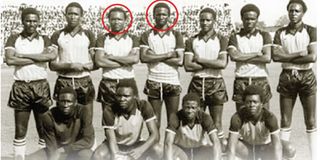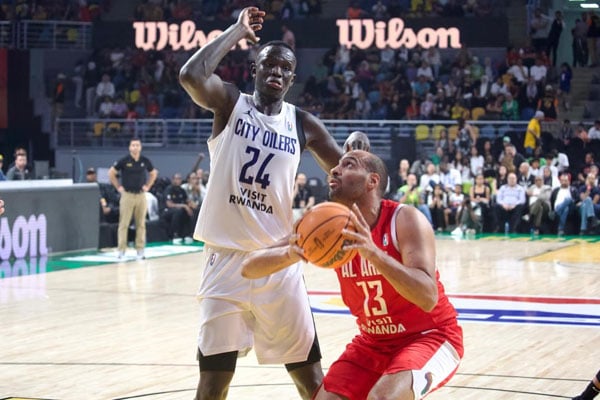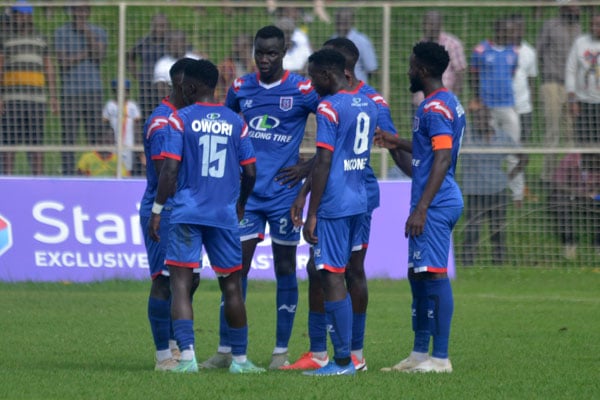Mukasa, Olum and Mokiri were deadly lefties that gave defences nightmares

The Uganda Cranes side of the late 1980s.Standing L-R: Phillip Omondi, Charles Baker Masiko, Fred ‘Gaso’ Mukasa, Alex Olum, Ronnie Vubya, Shaban Mwinda and Tom Lwanga. Squatting L-R: John Tebusweke, John Latigo, Paul Nkata and Charles Katumba. Mukasa and Olum (both circled) entertained whenever they graced the international stage. PHOTOS/COURTESY & FILE
What you need to know:
Old Fashioned But Stylish Wingers. These three struggled to earn first team football and cement their places at big clubs when they embarked on serious football careers. But at their peak, Fred ‘Gaso’ Mukasa, Alex Olum and Sunday Mokiri proved to be wingers of great pace with dribbling abilities that enabled them to easily feed strikers with cut-backs or crosses.
FRED ‘GASO’ MUKASA
He was ‘Omwana w’omwami’ having been born to the Buganda Kingdom chief, late Augustine Birimumaaso, of Mengo. Mukasa’s elder brother, the late John Kaddu, captained the national team - Uganda Cranes in the late 1960s and early 1970s and is ranked among the best footballers Uganda has ever produced.
Mukasa learned the ABC of football at school; right from Buganda Road Primary School to Lubaga Boys Secondary School (now Uganda Martyrs High School), Kololo SSS and later at Kisubi Technical Institute.
Mukasa took advantage of the guidance of Brother Bernadine Kamulaki, who was known for grooming and polishing footballing students, to improve his game at Uganda Martyrs.
He later headed to Kololo SSS, where he emerged a real star in the making playing alongside other future stars like Peter Mazinga and late Rashid Mudin.
The three were part of the formidable school team that won countless trophies in the post primary school championships.
Mukasa was at Kololo SSS in 1978 when UCB FC spotted and signed him. Unfortunately for him he could not fit in the club’s first eleven since the coach Ben “Big Ben” Kurtson Omoding preferred fielding the more experienced Fredrick Musisi Kiyingi and Daktari Jalobo on the left wing. He, however, featured in a few matches during the season in which UCB won the national league.
Feeling dejected, Mukasa left UCB and joined Coffee FC, where things, unfortunately, remained the same.
“At one time I was approached by a concerned teammate who said I was a good player but a bit weak and slow compared to other left wingers at Coffee.
“He advised me to join another club with a more experienced coach who would polish me into an outstanding first team player,” he said in an interview with us.
He took the advice and joined Nile FC of Jinja at the end of the 1980 season. There he found established players like Chris Ddungu (formerly at KCC), Mike Diku, Matthew Lucha, Patrick Lwanga, Sam Natulya, Wapicho and others.
Mukasa credits Nile’s coach Natal Mwaka for moulding him into a speedy and powerful left winger with his tough system of training.
“Mwaka made us run long distances that included climbing steep hills. We would take breaks by feeding on porridge and posho.” Mukasa also salutes teammate Sam Natulya for giving him football tips and teaching him how to cross dangerous balls from the left wing.
He enjoyed life at Nile where the Nile Breweries management used to give them crates of beers some of which the players would sell and earn quick money. Former Nile team manager Faisal Mohammed admitted to have recruited Mukasa from Coffee and Richard Makumbi to strengthen the team ahead of the 1981 season and in the African Club championship.
“Fred was instrumental and part of the team that played mighty Al Ahly of Egypt and defeated them 2-0 during the first round first leg tie at Nakivubo. We made history by becoming the first East and Central club to defeat them in a long time.” Faisal told Sunday Monitor.

Speed With Control. Mukasa ‘Gaso’ terrorised literally every defence he ran into for both club and country - hence earning the nickname Gaso after the transport company that manufactured buses that used to travel long distances at a reliable speed back then. PHOTO/COURTESY
Mukasa spent one season at Nile and in 1982 joined Kampala based Express FC with new players that included Issa Ssekatawa from Jinja-based Nytil FC.
It was Express’s chairman Jimmy Mugambe who lured him to the club after dishing him a big amount of money he could not reject.
At Express, Mukasa linked well with Ssekatawa to form one of the most formidable partnerships ever seen in Ugandan football.
At the time Ssekatawa used to be fed with countless good crosses from Mukasa on the left, something he utilized to score a lot of goals and easily emerged league top scorer for the consecutive seasons of 1982 and 1983.
Mukasa captained Express to the 1985 Uganda Cup victory, the first time the club was winning a major trophy in a decade.
In 1987, Mukasa left Express to return to Coffee in what was considered a suspicious transfer.
In an interview, Mukasa confirmed this, saying one Coffee official, “Alex Kiseego put” before him “Shs1m which was a lot of money at the time.”
“My Express boss Mugambe, said this was a lot of money I could not reject and advised me to grab it with both hands and join Coffee for just one season after which I would return to Express.
I used part of the money to build a posh house.” In the Cranes team, Mukasa’s debut match was a friendly against Burundi in 1981. In 1982 he scored the winner against Tanzania for the Cranes to storm the Cecafa final against Kenya at Nakivubo.
Mukasa retired from the national team in 1987 with one of the players replacing him on the left wing being Sunday Mokiri.
ALEX AWODE OLUM
One of those Nytil FC players the club fed to the national team the Cranes. Others include; Issa Ssekatawa, Geoffrey Higenyi, Yusuf Namonye, Fred Lukomwa, Jack Ntale just to mention a few. Former Nytil’s first choice goalkeeper Patrick Lukalu remembers Alex Olum to have joined as a teenager in the early 90s when former Fifa referee Israel Kintu was coaching the club.
“He was young but so talented, a gifted player that would feature in many positions including the midfield. At the time, for a player to be summoned to the Cranes team while playing for an upcountry club like Nytil proved he was too good to be left out,” Lukalu remarked.
Olum was summoned to the Cranes team during the era of coach Peter Okee, when the team was preparing for the 1983 Senior Challenge Cup (Cecafa) that was to be staged by Kenya. Olum’s participation was enough to alert the then Coffee coach Charles Omigi, who rushed to sign him at the end of the tournament.
At Coffee, Olum settled well especially when James Nswaswa replaced Omigi who had been promoted by the Coffee Marketing board and given other roles. It took Olum just two years to be given the captain’s armband at Coffee. And he led in performance by scoring 17 goals despite his club’s failure to win the league.
Did I say Coffee failing to win the league?” Well, 1985 is actually the season which many Ugandan football followers refer to as ‘when the league title was simply robbed’. Olum played a pivotal role to keep Coffee top of the table. But with just a few matches left, the club was deducted three points putting paid to their chances.
In 1987, Olum joined SC Villa, where he won three league titles and the 1987 Cecafa clubs tournament. In 1990 he joined Express, spending a short time there before heading to Nile.
“I signed him when Nile had been relegated and he worked hard with other old players to enable the club regain promotion to the top league,” recalls former team manager Faisal Mohammed. Olum was part of the Nile team that lost two consecutive Uganda Cup finals to Express in 1991 and 1992 with the fans and management suspecting him and some other players of being bribed by the opponents.
In a 1992 interview with the then authoritative Soccer World Magazine, Olum who had just turned a born again confessed that his life had been one of nothing but turmoil, controversies and full of bad omens in whatever venture he was involved with the last stroke being the accusation by Nile that he had been bribed by Express in the Uganda Cup finals.
SUNDAY MOKIRI
Sunday Mokiri was a product of the Walukuba suburbs of Jinja. The area produced so many footballers that played for Jinja-based clubs and many of them ended up being snatched by the giant teams of Kampala. It was in Walukuba that many natives stayed at the time when Asians filled up most of Jinja town.
Because natives in the suburbs lived a miserable life, some devised ways of surviving with the youth embarking on football.
Walukuba that produced other stars like Fred Bogere could be compared to Mulago, Naggulu and Kawempe areas of Kampala.

Household Name. Mokiri’s strength and ferocious shots made him a darling of many fans across Uganda.
Mokiri started playing serious football at Jinja-based Tobacco FC since his parents worked at British American Tobacco (BAT) branch there.
“He was so good with a powerful left foot and used to score so many goals that we plotted to snatch him from Tobacco. Unfortunately he refused to join us due to the influence of his relatives who worked at BAT,” Faisal Mohammed, who was team manager at Nile at the time, recalls.
However, the late Patrick Kawooya, not accustomed to failing in the transfer market, managed to get him to SC Villa around 1981, where he joined a strong squad that boasted stars like Paul Hasule, Jimmy Kirunda, Ronald Vubya, Godfrey Kisitu, George Otto, among others.
He was part of the SC Villa team that won the 1982 league unbeaten and the 1983 Uganda Cup after defeating rivals KCCA FC 1-0. He later won several other leagues titles. Mokiri also featured in the SC Villa team that won the regional Cecafa title in 1987. He left SC Villa in 1990.
He was first summoned to the Cranes team in 1979 when still at Tobacco as the team prepared for the 1979 Cecafa tournament.
He never featured in any match. Mokiri will always be remembered for the goal he scored for the Cranes against Cameroon in April 1987 during an Afcon qualifier at Nakivubo. Cranes who had lost the first leg in Yaounde 1-5 almost turned tables as they won 3-1 at home.
After earlier strikes from Fred Bogere and Phillip Omondi, Mokiri scored the third thrilling goal unleashing a bullet-like shot that ignited loud cheers from the capacity Nakivubo Stadium.




